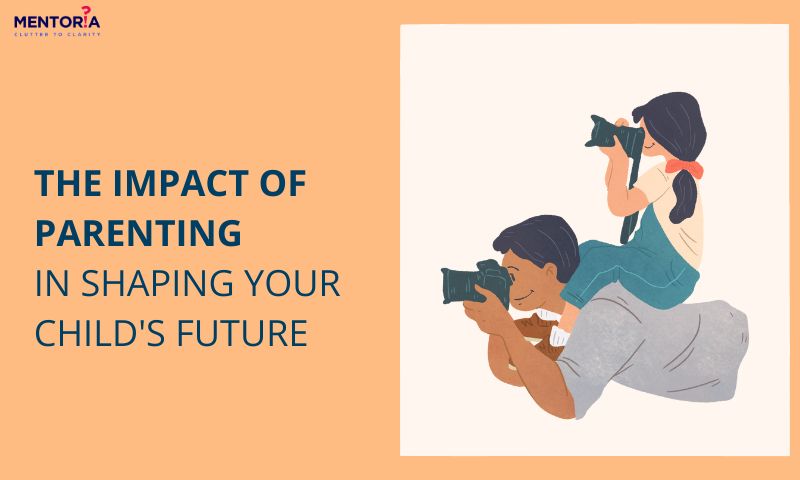The Impact of Parenting In Shaping Your Child’s Future

It’s incredible how children absorb information like sponges, soaking up experiences and observations that shape their personalities. Parents hold a tremendous responsibility in this journey of shaping young minds.
Parents indeed serve as the primary educators for their children. From the moment a child enters the world, they start learning from their parents’ actions, words, and behaviours. It’s like being a superstar on a stage where your every move is watched and emulated. Children mirror what they see in their parents; they pick up mannerisms, values, and attitudes, forming the building blocks of their own personalities.
The influence of parents on their children is unparallelled. It’s not just about teaching manners or academic skills; it’s about instilling core values that will guide them through life. Being a positive role model involves demonstrating empathy, kindness, resilience, and a strong work ethic. These attributes, when consistently displayed by parents, create a blueprint for children to follow. The impact of good parenting reverberates throughout a child’s life. It’s about fostering an environment where children feel loved, supported, and encouraged to explore their potential. By providing guidance, setting boundaries, and nurturing their emotional well-being, parents can help shape their children into confident, compassionate, and well-adjusted individuals.
It’s a journey that requires patience, consistency, and a whole lot of love. Every interaction, every conversation, and every moment spent together contributes to shaping the wonderful personality of a child. It’s a privilege and a responsibility that parents hold dear—to guide, inspire, and mould their children into remarkable individuals ready to take on the world. The blog covers the pivotal role parents play in shaping a child’s emotional, behavioural, cognitive, social, and moral development through love, discipline, intellectual stimulation, social modelling, resilience building, and imparting values.
Emotional Development
Building a secure attachment between parent and child in the early years is crucial. Responsive and sensitive caregiving creates a safe base from which children can explore the world and regulate their emotions. Parents help children learn to manage their emotions by modelling healthy coping strategies. Teaching techniques like deep breathing, mindfulness, or labelling emotions helps children recognise and regulate their feelings. Parents who encourage empathy and teach social skills by emphasising sharing, kindness, and consideration for others help children develop strong interpersonal skills. These abilities form the basis of healthy relationships later in life.
Validating a child’s emotions—whether positive or negative—helps them feel understood and accepted. Offering support during difficult times teaches children that their emotions are valid and that they can seek help when needed. Parents who demonstrate healthy conflict resolution skills teach their children valuable lessons about managing disagreements constructively. This fosters a positive approach to resolving conflicts in their own relationships. Encouraging children to express their emotions in a healthy way, without judgement or criticism, allows them to develop emotional intelligence and communication skills. Emotional development plays a crucial role in a child’s future, affecting their relationships, academic success, career success, mental health, resilience, and overall quality of life. Children who develop empathy, effective communication, and conflict resolution skills tend to form healthier, more fulfilling relationships in adulthood. Emotional intelligence, which includes understanding and managing emotions, can positively impact academic performance, as children with better emotional management often display greater focus, resilience, and motivation in their studies. Emotional intelligence also plays a crucial role in the workplace, as individuals who excel in leadership, teamwork, and adaptability are highly valued in professional environments.
Healthy emotional development is linked to better mental health outcomes, as children who manage their emotions are less likely to experience anxiety, depression, or other mental health issues later in life. Emotional awareness and adeptness in managing feelings lead to higher levels of happiness and fulfilment in various aspects of life. Children with strong emotional development skills are more resilient in the face of challenges and setbacks.
In conclusion, emotional development serves as a cornerstone for a child’s future well-being, affecting their relationships, academic and career success, mental health, resilience, and overall quality of life.
Behavioural Patterns
Children often mimic the behaviours they observe in their parents or caregivers. If parents demonstrate respectful, kind, and responsible behaviour, children are more likely to adopt similar traits. Consistent and fair discipline helps children understand boundaries and acceptable behaviour. Parents who use positive reinforcement and constructive discipline methods tend to have children with better behavioural patterns. Open and effective communication between parents and children fosters understanding. When children feel heard and understood, they are more likely to exhibit positive behaviours and cooperate with parental guidance.
Different parenting styles (authoritative, authoritarian, permissive) shape children’s behaviours differently. Authoritative parenting, which involves setting clear rules with warmth and responsiveness, often results in more positive behavioural outcomes. Providing a stable and structured environment helps children feel secure and reduces behavioural issues. Predictable routines and consistent expectations contribute to better behaviour. Children who receive emotional support from their parents are better equipped to handle stress and regulate their emotions. This support reduces the likelihood of negative behavioural patterns.
Encouraging positive behaviours and reinforcing them with praise or rewards reinforces those patterns. This positive reinforcement motivates children to continue exhibiting desirable behaviours. Behavioural patterns play a crucial role in a child’s future, impacting their academic achievement, social relationships, emotional well-being, career prospects, decision-making abilities, legal outcomes, and overall life satisfaction. Positive behaviours like focus, discipline, and following instructions lead to better academic performance and engagement. Social relationships are shaped by positive behaviours like empathy, cooperation, and effective communication skills, which are essential for success in various aspects of life. Emotional well-being is also influenced by positive behaviours, such as constructive emotion expression, stress management, and seeking help. Positive behavioural traits, such as teamwork, adaptability, leadership, and problem-solving skills, contribute to career success and advancement.
Decision-making abilities are shaped by behavioural patterns, with children who learn responsible decision-making and self-control making informed choices as adults. Negative behavioural patterns can lead to legal and behavioural issues if not addressed, so early intervention and guidance can prevent such consequences. Overall, positive behavioural patterns contribute to healthier lifestyles, better relationships, and a sense of accomplishment and contentment. Parenting and the surrounding environment play a crucial role in shaping these behaviours and the child’s future trajectory.
Cognitive Development
Parents who engage children in stimulating activities, conversations, reading, and exposure to diverse experiences foster cognitive growth. Providing a rich and varied environment promotes curiosity and intellectual development. The quality of early learning experiences, such as playing with educational toys, engaging in imaginative play, and exposure to educational materials, lays the groundwork for cognitive skills development. Parents who engage in conversations, storytelling, and reading aloud help enhance a child’s language skills. Language development is a crucial aspect of cognitive growth and forms the basis for learning and communication.
Encouraging children to solve puzzles, engage in games that require strategic thinking, and asking open-ended questions promotes problem-solving abilities and critical thinking skills. Parents who actively support and participate in their child’s education by showing interest, assisting with homework, and providing a conducive learning environment positively impact cognitive development. Allowing children to explore and discover things independently promotes cognitive growth. It encourages curiosity, creativity, and a deeper understanding of the world around them.
The impact of strong cognitive development on a child’s future is profound. Strong cognitive skills lay the foundation for academic achievement, as children with developed cognitive abilities often excel in school. Cognitive development helps children adapt to new situations, learn from experiences, and problem-solve effectively, which is valuable in various aspects of life. Well-developed cognitive skills, including analytical thinking, creativity, and problem-solving, are highly sought after in the job market, influencing future career prospects. A strong cognitive foundation fosters a love for learning, encouraging individuals to pursue continuous education and personal growth throughout their lives.
Social Skills
Social skills encompass a range of abilities that enable individuals to interact effectively and harmoniously with others. Parenting plays a crucial role in shaping a child’s social skills development. Parents serve as role models for social interactions. Children observe and learn social behaviours, including communication styles, empathy, conflict resolution, and cooperation, by watching their parents’ interactions. Parents can encourage empathy by helping children understand and consider others’ perspectives and emotions. This skill forms the basis for healthy relationships and understanding social cues.
Open communication at home encourages children to express themselves, articulate their thoughts, and listen attentively. These skills are essential for effective social interactions. Playtime and social interactions with siblings or peers are crucial for developing social skills. Parents who facilitate and encourage such interactions support their children’s social development. Establishing clear social expectations, such as manners, politeness, and respect for others, helps children navigate social situations more effectively. Teaching children how to resolve conflicts peacefully, negotiate, and find compromises builds essential social skills that foster positive relationships. Parents who encourage and support their children’s friendships provide opportunities for social learning, collaboration, and understanding the dynamics of relationships.
Individuals with developed social skills tend to have healthier, more fulfilling relationships both personally and professionally. Strong social skills contribute to success in collaborative settings, such as teamwork in the workplace or group projects in academic settings. Good social skills often correlate with higher emotional intelligence, leading to better mental health and resilience in dealing with life’s challenges. Effective communication, empathy, and the ability to work well with others are highly valued in the workplace, influencing career success and advancement.
Parenting practises that nurture social skills significantly impact a child’s ability to form relationships, collaborate, communicate effectively, and navigate various social contexts, laying the groundwork for success and fulfilment in their future endeavours.
Resilience and Adaptability
Resilience and adaptability are crucial life skills that help individuals navigate challenges, setbacks, and changes effectively. Providing a supportive and nurturing environment at home helps children feel secure and confident. This foundation enables them to tackle challenges with more resilience. Parents can teach children coping strategies, such as problem-solving skills, positive self-talk, and mindfulness techniques, to manage stress and adversity effectively.
Allowing children to take age-appropriate risks and make decisions fosters independence and resilience. It helps them learn from failures and adapt to different situations. Parents who encourage a growth mindset—that mistakes and failures are part of learning—help children develop resilience by seeing setbacks as opportunities for growth. Parents who exhibit resilience themselves serve as powerful role models for their children. Demonstrating how to bounce back from challenges teaches valuable lessons. Families that embrace change and adaptability help children develop the skills needed to navigate an ever-changing world. Flexibility and adaptability become natural traits.
Resilient individuals are better equipped to manage stress, anxiety, and other mental health challenges, leading to better overall well-being. Children who learn to adapt and bounce back from setbacks tend to be more successful in various aspects of life, including academics, career, and relationships. Resilient individuals are better problem solvers, capable of finding creative solutions to challenges they encounter. Resilience often goes hand in hand with emotional intelligence. Children who are resilient tend to have a better understanding of their emotions and those of others. Parenting practises that nurture resilience and adaptability empower children to face life’s challenges with courage, flexibility, and perseverance, equipping them with essential skills that contribute to their success and well-being in the future.
Values and Beliefs
Values and beliefs play a significant role in shaping a child’s worldview, moral compass, and decision-making processes. Parenting strongly influences the development and transmission of values and beliefs. Parents serve as primary role models, and children often emulate the values and behaviours they observe in their parents. Consistency between what parents say and do reinforces the importance of those values. Encouraging open dialogue about values, ethics, and beliefs allows children to understand the reasoning behind certain values and develop their own perspectives.
Family rituals, traditions, and celebrations often carry embedded values. Participating in these activities helps children internalise these values and understand their significance. Parents who prioritise empathy, kindness, and compassion instil these values in their children. Teaching the importance of considering others’ feelings and perspectives shapes their moral framework. Parents can encourage children to think critically about values and beliefs by discussing different viewpoints, fostering independent thought, and supporting respectful debate. Clear expectations based on values and beliefs help children understand the family’s moral code and guide their behaviour.
The impact of instilling values and beliefs in children is far-reaching. Values and beliefs contribute to the development of a child’s character, influencing their moral judgement and ethical decision-making as they grow older. Children raised with strong values are more likely to make decisions aligned with those values, leading to responsible behaviour and positive choices. Shared values often form the basis for forming connections within communities and building meaningful relationships. Values and beliefs shape a child’s identity and sense of belonging, providing a framework for understanding themselves and the world around them. In essence, parenting practises that emphasise and reinforce positive values and beliefs contribute significantly to a child’s moral development, guiding their actions, decisions, and interactions throughout their lives.
Facing Challenges With Mentoria
Parenting is a challenging but rewarding job. By providing their children with love, support, and guidance, parents can help their children develop into healthy, well-adjusted, and successful adults. Mentoria’s career counsellors provide personalised guidance to help students and professionals identify their interests, skills, and values, and develop a plan to achieve their career goals, as well as building a future. We can also help them narrow down their career options and choose a career that is a good fit for them.









